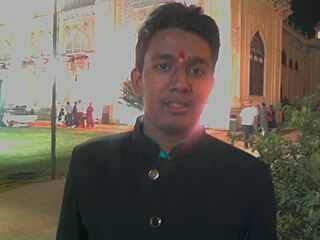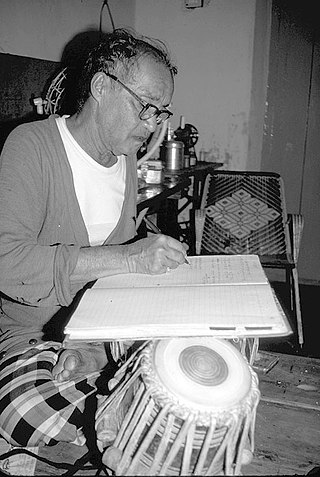
La Monte Thornton Young is an American composer, musician, and performance artist recognized as one of the first American minimalist composers and a central figure in Fluxus and post-war avant-garde music. He is best known for his exploration of sustained tones, beginning with his 1958 composition Trio for Strings. His compositions have called into question the nature and definition of music, most prominently in the text scores of his Compositions 1960. While few of his recordings remain in print, his work has inspired prominent musicians across various genres, including avant-garde, rock, and ambient music.
Pandit Pran Nath was an Indian classical singer and master of the Kirana gharana singing style. Promoting traditional raga principles, Nath exerted an influence on notable American minimalist and jazz musicians, including La Monte Young, Terry Riley, and Don Cherry. He began performing in the United States in the 1970s, and established the Kirana Center for Indian Classical Music in 1972; he subsequently taught in various universities across the US and Europe.

Ustad Amir Khan was one of the greatest and most influential Indian vocalists in the Hindustani classical tradition. He was the founder of the Indore gharana.
Drone music, drone-based music, or simply drone, is a minimalist genre that emphasizes the use of sustained sounds, notes, or tone clusters – called drones. It is typically characterized by lengthy audio programs with relatively slight harmonic variations throughout each piece. La Monte Young, one of its 1960s originators, defined it in 2000 as "the sustained tone branch of minimalism". Elements of drone music have been incorporated in diverse genres such as rock, ambient, and techno.
Jon Gibson was an American flutist, saxophonist, composer and visual artist, known as one of the founding members of the Philip Glass Ensemble. He was a key player on several seminal minimalist music compositions. He was born in Los Angeles to Charles and Muriel Gibson, both educators, and grew up in El Monte, a suburb.

Ustad Abdul Karim Khan was an Indian classical singer and, along with his cousin Abdul Wahid Khan, the founder of the Kairana gharana of classical music.
Kirana gharana is one of the Indian classical khyal gharanas, and is concerned foremost with perfect intonation of notes (swara).
Michael Harrison is an American contemporary classical music composer and pianist living in New York City. He was a Guggenheim Fellow for the academic year 2018–2019.

The Patiala gharana is one of the vocal gharanas of Hindustani classical music, named after the city of Patiala in Punjab, India where it was established. The gharana was founded in the mid to late 19th century by Mian Kallu, a sārangi player of the Jaipur durbar. He received his musical training from the last Mughal king Bahadur Shah Zafar’s court musician Qutub Bakhsh ‘Tanras’ Khan and went on to become the court musician to the Maharaja of Patiala. Eventually, the mantle was passed on to his son, ‘General’ Ali Baksh Khan and his close friend ‘Colonel’ Fateh Ali Khan, both of whom became court musicians in the court of Maharaja Rajinder Singh. The titles of 'general' and 'colonel' of music were bestowed upon them by the Victor Alexander Bruce, the 9th Earl of Elgin, after the duo had enthralled him with their performance. Their pairing was popularly referred to as 'Ali-a-Fattu ki Jodi.'
Pandit Budhaditya Mukherjee is an Indian classical sitar and surbahar maestro of the Imdadkhani gharana (school), recognizable by his intricate vocalic playing complemented by spectacular high speed playing. He holds a unique distinction of being the ever first artist in history to perform in the House of Commons, London. Famously proclaimed the "sitar artist of the century" by veena great Balachander, he has performed in thousands of concerts since the 1970s in India, America, Australia, the UAE, and almost all of Europe.
Marian Zazeela is an American light artist, designer, calligrapher, painter and musician based in New York City. She was a member of the 1960s experimental music collective Theatre of Eternal Music, and is known for her collaborative work with her husband, the minimalist composer La Monte Young.
The Gwalior Gharana is one of the oldest Khyal Gharana in Indian classical music. The rise of the Gwalior Gharana started with the reign of the Mughal emperor Akbar (1542–1605).
Ustad Abdul Wahid Khan (1871–1949) was an Indian subcontinental singer from the Kirana gharana. He died in 1949 in Saharanpur, India.
Sureshbabu Mane was a prominent Hindustani classical music singer of Kirānā Gharānā in India. He was the son of a doyen of Kirana Gharana, Ustad Abdul Karim Khan.
Rajkumar Shyamanand Sinha was the eldest son of Raja Bahadur Kirtyanand Sinha of the Banaili estate. As the eldest child of a Raja, Shyamanad Sinha had many pursuits that were the hallmark of the aristocracy then but he was especially notable for his talent and ability in hindustani classical music.
Indore gharana is one of the vocal gharanas of Indian classical music. It was founded by Amir Khan, who studied the styles of Abdul Wahid Khan, Aman Ali Khan, Rajab Ali Khan and Abdul Karim Khan and amalgamated their style.

Pandit Mani Prasad was an Indian classical vocalist from the Kirana gharana.

Baba Bhaskar Nath is an Indian classical instrumentalist. He plays the Shehnai belonging to Meerut Shehnai Gharana. He is a child prodigy.

Shaikh Dawood Khan, also known as Ustad Shaikh Dawood, Ustad Sheikh Dawood and Daud Khan, was a performer on the Indian tabla. He was formerly a staff artist at All India Radio, Hyderabad, India.

Jung Hee Choi is a South Korean-born artist and musician, based in New York City, working in video, performance, sound and multi-media installation. Since 1999, Choi has been a disciple of La Monte Young and Marian Zazeela in the study of music and art. Choi, with Young and Zazeela, is a founding member of The Just Alap Raga Ensemble, and has performed as vocalist with the ensemble since 2002. Choi's work has been presented in the U.S., Europe and Asia, including FRAC Franche-Comté, France; Berliner Festspiele, Germany; Dia Art Foundation, Guggenheim Museum and MELA Foundation Dream Houses, NYC; FRESH Festival, Bangkok; and the Korea Experimental Arts Festival, Korea. The New York Times listed Choi’s Tonecycle for Blues performed by her Sundara All Star Band as one of The Best Classical Music Performances of 2017.







